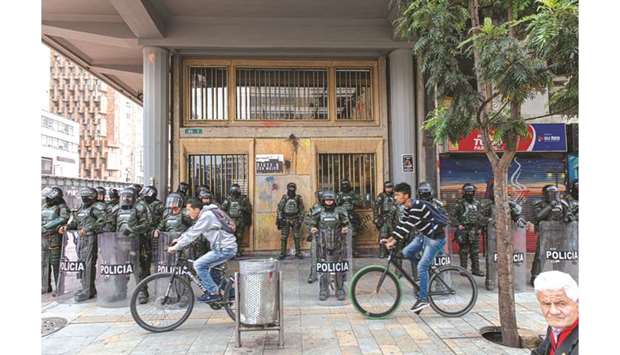Colombia’s credit rating is under threat from tax cuts being debated by congress, former finance minister Mauricio Cardenas said.
The government’s tax bill would reduce its revenues by about 1% of gross domestic product in 2022, Cardenas said. President Ivan Duque’s administration is taking a gamble by betting on faster growth and lower tax evasion to keep the fiscal deficit in check, he said.
“It’s putting Colombia at a serious risk of a downgrade and that’s something that we should avoid,” Cardenas said on Thursday, in an interview in Bogota.
Cardenas, who served as finance minister from 2012 to 2018, called on congress to reject some of the more costly measures, such as a proposal that would allow companies to deduct some municipal taxes from their national tax payments. This on its own would deprive the treasury of revenue equivalent to 0.7% of GDP, without doing much to boost growth, he said.
Even with a downgrade, Cardenas said the country would still retain its investment grade rating. The finance ministry declined to comment.
The government needs to cut the deficit to 2.7% of GDP this year, and 2.3% in 2020, to avoid breaching the limits established by the balanced budget law. To achieve this, Duque has been helped by a surprise $2.2bn windfall profit from the central bank, and by dipping into the cash balance of state-controlled oil company Ecopetrol S.A.
“Is this sustainable? No,” Cardenas said. “The medium-term fiscal situation of Colombia hasn’t been resolved.”
Moody’s Investors Service and Fitch Ratings rate Colombia two notches above junk, while S&P Global Ratings rates the country at the lowest level of investment grade.
The government said last month that it is seeking a special dividend of $1.1bn from Ecopetrol, of which its share would be about $920mn.
Cardenas said he always resisted the temptation to do this when he was minister, even when times were hardest.
Including the special dividend and regular dividends, the company will be paying out more than 80% of its 2018 profits to shareholders, according to a study by Itau’s Colombia brokerage.
If the dividend payout ratio is routinely above 60%, the company’s finances and credit rating are going to deteriorate, Cardenas said.
Cardenas, who as minister used to chair central bank policy meetings, said there’s a 25% probability that the government will cut borrowing costs next year, if external conditions are weak and growth is below potential.

Riot police stand guard outside the Central Bank of Colombia building during a national strike in Bogota on November 21. President Ivan Duque’s administration is taking a gamble by betting on faster growth and lower tax evasion to keep the fiscal deficit in check, former finance minister Mauricio Cardenas said.
